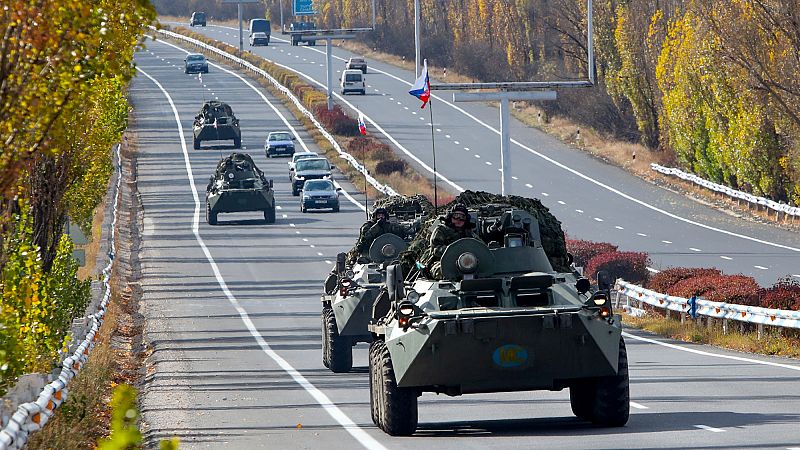Russia’s Military Presence in Armenia: A Growing Concern
Ukraine’s military intelligence (HUR) has reported an increase in Russia’s military presence in Armenia, highlighting a potential shift in regional dynamics. According to HUR, there is evidence suggesting that Moscow is reinforcing its military forces at a base in Gyumri, which has raised concerns about the broader implications for global security.
The Claim and Denial
On 5 July, Ukrainian military intelligence warned that Russia was increasing its forces at the Gyumri base, aiming to exert greater influence in the South Caucasus and “destabilise the global security situation.” However, this claim was quickly denied by Armenia’s Foreign Ministry on the same day.
Days later, HUR released what it described as an official Russian army order, claiming it was issued by the commander of the Southern Military District of the Russian Armed Forces. This document outlines measures for the “replenishment” of the Russian military base in Armenia. It includes a list of steps for selecting personnel from the 8th, 18th, 49th, and 58th combined arms armies of the Southern Military District. The order also details specific criteria for professional fitness, psychological resilience, and combat readiness. Notably, it explicitly prohibits the recruitment of individuals involved in drug trafficking or the distribution of psychotropic substances.
Strategic Importance of the Gyumri Base
Gyumri, the second-largest city in Armenia with a population of over 100,000, holds strategic significance due to its proximity to the border with Türkiye and Azerbaijan. Located around 100km northwest of the capital Yerevan, the city is just 3.5km away from the border with Türkiye, Azerbaijan’s closest ally.
The 102nd Military Base in Gyumri was established in the 1990s by Armenia and Russia. Initially, the base was intended to protect the border with Türkiye and enable quick deployment to the Karabakh region in case of Azerbaijani military movement. However, this did not occur in 2023 when Baku reclaimed full control of the Karabakh region after a rapid military campaign.
In 2024, Armenia took an unprecedented step by freezing its participation in the Kremlin-led Collective Security Treaty Organisation (CSTO), which serves as Moscow’s counterpart to NATO. Prime Minister Nikol Pashinyan previously expressed his belief that there was “no advantage” in the presence of Russian troops in Armenia. Despite this, the Gyumri base remained operational, as both countries agreed in 2010 to extend the lease of the base until 2044.
Current Dynamics and Regional Tensions
The 102nd military base in Gyumri is the largest Russian military facility in the South Caucasus, hosting up to 5,000 personnel. It is equipped with MiG-29 fighter jets and S-300 air defence systems. However, as Armenia seeks to normalise relations with Azerbaijan and Türkiye, the Russian base is increasingly viewed as no longer serving Yerevan’s interests.
Armenia is actively working to reopen its joint border with Türkiye, which could significantly improve relations and help alleviate the country’s isolation. Türkiye, a close ally of Azerbaijan, closed the border crossing point in 1993 in solidarity with Baku over the ongoing conflict in the Karabakh region.
Recent tensions between Azerbaijan and Russia have further complicated the situation. Turkish President Recep Tayyip Erdogan has expressed support for Armenia’s peace efforts with Azerbaijan. Additionally, the recent deaths of two ethnic Azerbaijanis arrested by Russian police for decades-old murders and the crash of an Azerbaijan Airlines passenger jet in December—blamed by Baku on Moscow—have severely strained relations between the two countries.
Conclusion
The growing military presence of Russia in Armenia, particularly at the Gyumri base, raises significant concerns about regional stability and global security. As Armenia navigates its relationships with Azerbaijan, Türkiye, and Russia, the strategic importance of the Gyumri base continues to be a focal point of international attention. The evolving dynamics in the South Caucasus underscore the need for careful diplomatic engagement and vigilance in maintaining peace and security in the region.







